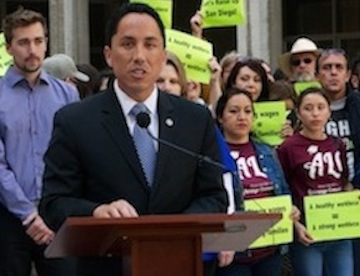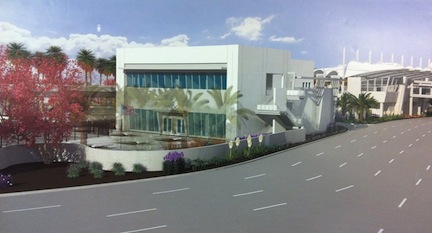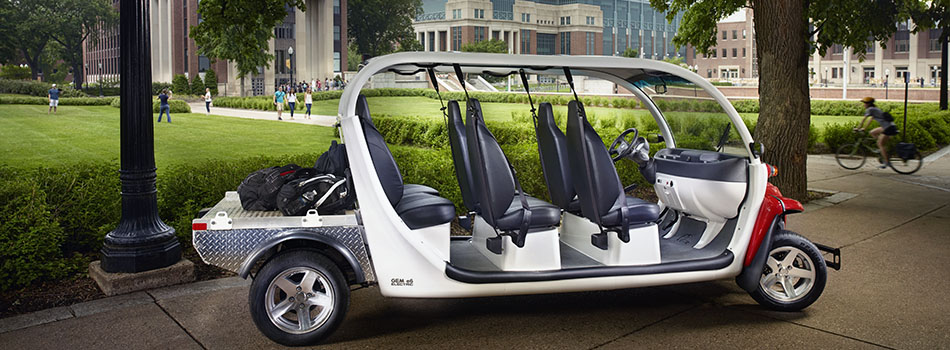Daily Business Report-Nov. 17, 2014
RESEARCH
The Dirty Side of Soap
Report: Triclosan, a common antimicrobial in personal hygiene products, causes liver fibrosis and cancer in mice
Triclosan is an antimicrobial commonly found in soaps, shampoos, toothpastes and many other household items. Despite its widespread use, researchers at UC San Diego School of Medicine report potentially serious consequences of long-term exposure to the chemical. The study, published today by Proceedings of the National Academy of Sciences, shows that triclosan causes liver fibrosis and cancer in laboratory mice through molecular mechanisms that are also relevant in humans.
Some of the Products containing triclosan



“Triclosan’s increasing detection in environmental samples and its increasingly broad use in consumer products may overcome its moderate benefit and present a very real risk of liver toxicity for people, as it does in mice, particularly when combined with other compounds with similar action,” said Robert H. Tukey, professor in the departments of Chemistry and Biochemistry and Pharmacology. Tukey led the study, together with Bruce D. Hammock, professor at UC Davis. Both Tukey and Hammock are directors of National Institute of Environmental Health Sciences Superfund Programs at their respective campuses.
Tukey, Hammock and their teams, including Mei-Fei Yueh, PhD, found that triclosan disrupted liver integrity and compromised liver function in mouse models. Mice exposed to triclosan for six months (roughly equivalent to 18 human years) were more susceptible to chemical-induced liver tumors. Their tumors were also larger and more frequent than in mice not exposed to triclosan.
The study suggests triclosan may do its damage by interfering with the constitutive androstane receptor, a protein responsible for detoxifying (clearing away) foreign chemicals in the body. To compensate for this stress, liver cells proliferate and turn fibrotic over time. Repeated triclosan exposure and continued liver fibrosis eventually promote tumor formation.
Triclosan is perhaps the most ubiquitous consumer antibacterial. Studies have found traces in 97 percent of breast milk samples from lactating women and in the urine of nearly 75 percent of people tested. Triclosan is also common in the environment: It is one of the seven most frequently detected compounds in streams across the United States.
“We could reduce most human and environmental exposures by eliminating uses of triclosan that are high volume, but of low benefit, such as inclusion in liquid hand soaps,” Hammock said. “Yet we could also for now retain uses shown to have health value — as in toothpaste, where the amount used is small.”
Triclosan is already under scrutiny by the FDA, thanks to its widespread use and recent reports that it can disrupt hormones and impair muscle contraction.
Rare Conference Puts China and Taiwan
Reps Together With San Diego Firms
A dozen investors from China will meet with Taiwanese trade representatives during a unique county-sponsored conference Nov. 19-22 to gauge their interest in doing business with San Diego companies.
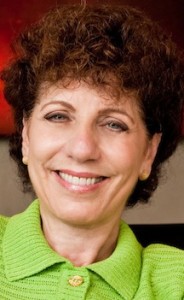
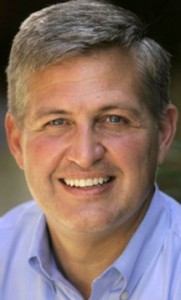
The conference, “Make It In America,” will spotlight what makes San Diego unique in the global marketplace. It will be held at the California Center for the Arts in Escondido. It is open to the public.
“San Diego is one of the most diverse communities in the country and what comes with that are the links our people have with countries they, their parents or grandparents came from,” said Rosalynn Carmen, president of the Asian Heritage Society, which is organizing the conference. Major participants are Alliant International University, Connect of San Diego, the San Diego Regional Economic Development Corporation and San Diego Gas and Electric.
To register for free admission go to www.makeitinamerica.net.
Barbara Bry of San Diego, recently named to the National Advisory Council on Innovation and Entrepreneurship by U.S. Secretary of Commerce Penny Pritzker, will deliver opening remarks with San Diego County Supervisor Dave Roberts and meet with the Chinese delegation together with representatives of the Taipei Economic and Cultural Office in Los Angeles to gauge their potential interest in San Diego and how they may collaborate with leading business here.
The delegation from China represents such diverse interests as Shanghai’s Chang Feng Business Center District Investment Corp., the World Chinese Entrepreneurs Association, CCOM-TV and the Beijing International Relationship Institution
Topics will range from starting a business, the benefits of relocating here from Asia, latest advances in technology, including nanotechnology, robotics, unmanned aerial vehicles , commonly referred to as drones, and even video games.
“Business diversity is a key pillar of San Diego’s success and this year we mark an important milestone with the Make it in America Conference,” said Roberts, host and chairman, adding that the “flagship event offers Asian American industry and business communities the chance to come together network, engage in business opportunities and to discuss ideas on how to effectively compete in the local and global marketplace.”

Google Glass Said to Help Users
Put Away Their Smartphones
A marketer from the Google Glass team told Rady School of Management students Friday that wearable computing can get people to look up from their smartphones and interact with each other.
“It really is best used for those quick, micro interactions,” said Zoe Jerchower, a “Glass Guide” at Google’s offices in New York. “It’s there when you need it and out of your way when you don’t.”
She said a quick glance at the Google Glass screen replaces pulling out a smartphone and ignoring those around you. She showed the MBA students a slide of four women seated at breakfast and looking at their smartphones to illustrate the kind of behavior the technology could change.
Google Glass, now on its 23rd software revision, has a tiny screen mounted on an eyeglass frame. The software includes Google search, directions, messaging, a calendar, a camera and voice recognition to direct the device.
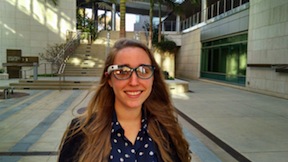
Tens of thousands are in public hands, Jerchower said, with most users in New York, Los Angeles and San Francisco.
She said the technology can help the disabled, and also has applicability in many specialized industries, showing a video of a construction worker using one on a project.
“We need to make sure that what we’re wearing serves a purpose,” she said.
The talk was sponsored by the Rady School’s student-run Tech Club, and included other speakers and question-and-answer sections. — Times of San Diego
Joint Strike Fighter Makes First Night
Flight From Carrier Off San Diego

The F-35C Lightning II carrier variant Joint Strike Fighter conducted its first carrier-based night flight operations aboard the USS Nimitz off the coast of San Diego.
Navy test pilot Lt. Cmdr. Ted “Dutch” Dyckman piloted F-35C test aircraft for the inaugural night flight. Dyckman conducted a series of planned touch and goes before making an arrested landing.
Through last Thursday, two test aircraft have completed 28 flights for a combined 34.5 flight hours. The aircraft also performed 108 catapult launches, 215 planned touch-and-go landings, two long touch and go landings, 110 arrested landings and zero “bolters,” or landings in which the aircraft doesn’t catch the arresting cable and has to immediately return to flight.
The Joint Strike Fighter is single-seat, single-engine stealth fighter built by Lockheed Martin. The program is one of the most expensive in the military, with variants being produced for the Air Force and Marines, as well as many foreign countries. — Times of San Diego
Housing Affordability Still a Problem in San Diego
San Diego home prices are not going up as fast as they did earlier this year, but affordability continues to be a major issue.
A new Interest.com report finds San Diego is the second least affordable housing market among the nation’s 25 largest cities. Only San Francisco is less affordable.
San Diego’s median income is about 38 percent below what it would take to buy a median priced home.
Least Affordable Markets
Five cities got a letter grade of “F” from Interest.com for a lack of housing affordability. The cities and the percent their residents’ median income was below the median home price are:
Miami: -25.88 percent
Los Angeles: -31.70 percent
New York: -31.99 percent
San Diego: -38.23 percent
San Francisco: -45.64 percent
That is not a surprise to San Diego State University real estate instructor Mark Goldman. “We have very limited supply. We have very very strong demand, but the price that people are able to pay is limited by affordability,” Goldman said. “You know, we can only go so high and we start squeezing people out of the market.”
“People don’t have unlimited resources. But the percentage of gross income utilized for housing, whether its rent or to own a home, typically is much higher in San Diego,” Goldman said.
Faulconer Projects $58.5M Surplus Next Fiscal Year
The city of San Diego is projecting budget surpluses throughout the next five fiscal years, according to a financial outlook released by Mayor Kevin Faulconer.
Simply accounting for basic city functions, San Diego would be $58.5 million in the black for the next fiscal year, with the surplus steadily growing until it reaches $164.1 million in Fiscal Year 2020.
However, city officials are grappling with an inability to retain experienced police officers, an infrastructure deficit estimated to be around $2 billion, and a need to comply with state water quality requirements.
With those spending priorities added in, the first-year surplus is reduced to $2.9 million, with growth projected to $61.8 million in FY 2020.
“The good news is we can continue my focus on neighborhood improvements because our economy is growing again and the days of budget cuts appear to be in our rearview mirror,” said Faulconer. “With a modest surplus projected, the city must continue with a fiscally responsible and results-driven approach in order for more tax dollars to be invested in roads, parks and other neighborhood amenities.”
Faulconer said he will try to create more economic opportunities in San Diego to further expand revenue.
The city is expecting steady increases in its major income areas of property taxes, sales taxes and hotel room night taxes — all of which are dependent on a stable or growing economy.
— City News Service


